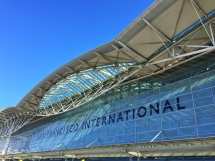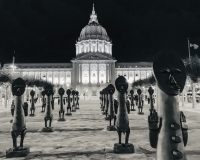THE PERSONAL JOURNEY OF IMMIGRATION

Whether you leave for some months, years or forever, whether you chose it or put up with it, settling down in a new country is an overwhelming experience.
Language, cultural, psycholigical shocks are part of the journey. Isabelle DeArmond, a licensed psychlogist from Berkeley, describes, details and analyzes the different aspects of this exciting, and yet distressing adventure.
A TWO-WAY CULTURAL SHOCK
Immigration is a rupture from one’s culture, family, friends, and social network. Despite some initial enthusiastic idealization of the new culture, immigration entails the losses of one’s environment and culture and, in some cases, nostalgia. Immigration entails a geographical and symbolic distancing from motherland, in this case France. When we leave, we leave behind a culture and, as we become more and more familiar with American culture, we start to see French culture with new eyes. We discover what we took for granted before, sometimes with great enthusiasm, sometimes with a critical eye. These new eyes on culture forces us to redefine some of our values and this is unsettling for all of us, and sometimes traumatic. Generally, after a stage of intense idealization, the process is to reject values of the country of immigration before adopting a personal blend.
CORPORATE ENVIRONMENT
This cultural shock happens in many different settings, including corporate environment. For example, the emphasis on teamwork, the importance of assertiveness in American culture can be unsettling at the beginning for French immigrants. The definition of leadership often seems to include an emphasis on a “heroic” style at the expense of the fluid, relational, and sometimes ambiguous style of leadership commonly experienced in Europe. These differences of leadership are important to capture especially since immigration generally corresponds to a professional opportunity for learning and advancing one’s career. When an entire family immigrates, the different members of the family move through the different stage of adaptation at a different pace, which creates frictions and children very often lack the support they need at this difficult time as parents are preoccupied with their own difficulties.
THE LANGUAGE CHALLENGE
Language is obviously a barrier for adjustment, even when one is relatively fluent in English. Most of us keep some accent and this instantaneously signifies our difference. The people with whom we communicate project stereotypes of what they consider belonging to the French character and this is a difficulty to overcome to build genuine relationships. My observation is that French language, with its emphasis on nuances, its rapturous willingness to remain open to multiple significations is in contrast with the rich vocabulary of American language. What is certainly the most difficult to overcome is the implicit communication. We all experienced how difficult it is to translate a joke. As we speak, we have culturally different images, and associations in mind. Non-verbal communication also includes eye contact which is notably different in America, where prolonged eye contact is viewed as a sign of integrity in contrast to France where this prolonged eye contact has a negative, invading connotation.
OUR RELATIONSHIP TO OUR FAMILY
It is not exceptional to observe serious psychological difficulties induced by immigration. The relational difficulties with loved ones in France are often intensified by an internal experience of estrangement in addition to the geographical distance. This experience of estrangement can be projected and becomes then confirmed in external reality.
A GREAT OPPORTUNITY
These difficulties of adjustment do not fully summarize the experience of immigration. The picture would not be complete without mentioning the equally rich chance of personal growth offered by immigration. Becoming aware of one’s home culture is a tremendous chance to choose one’s identity instead of taking it for granted. Adopting a blend of culturally defined values based on one’s experience is an enrichment. Immigration is certainly an experience which could help develop some fluency across cultures, which is critical in an increasingly multicultural environment. This multicultural fluency is an asset at school, at work, and of course for personal life. Finally, one leaves one’s country for practical reasons and also for symbolic and often unconscious reasons.
A BETTER SELF-KNOWLEDGE
Uncovering the motivations for immigration, one’s personal meaning of distance, is a way to enrich self-knowledge and develop one’s personality. Immigration is often a striving for wholeness and as such, has the power to shape one’s cultural and personal identity and ferment personal growth.
Isabelle DeArmond Ph.D.
Licensed Psychologist, Berkeley, CA
ref: Psychoanalytic perspectives on migration and exile, L.Grinberg & R.Grinberg
Agenda
-
Movie releases, Festivals & DVDs
-
Theatre plays, Ballet, Opera
-
Jazz, Rock, Pop, Symphonic & Co
-
Museums and Art Galleries
-
For them... with them...
-
Games and sports events
-
If you have some spare time...
















